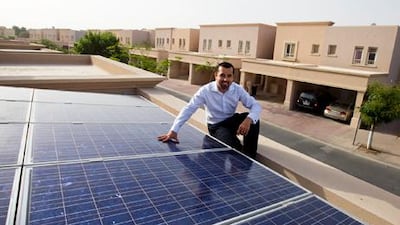Europe has become a world leader in solar-power production, with often-cloudy Germany leading the pack.
Essential to that progress have been feed-in tariffs, a mechanism that obliges local utilities to buy locally produced renewable electricity at a predetermined price.
But does the remarkable success of such tariffs in Europe make them the best bet to jump-start solar in sunny Abu Dhabi, as the emirate strives to reach its target of getting 7 per cent of its energy from renewable sources by 2020?
Plans by Abu Dhabi's electricity regulator to introduce a feed-in tariff for rooftop photovoltaics (PV) indicate that this question has been answered with a "yes".
Feed-in tariffs were developed in the European context, and it must be kept in mind that they are not the only way of promoting private investment into renewables.
In Abu Dhabi, in particular, an effective and efficient policy could be designed to take advantage of the bountiful supply of both sunlight and unused land.
While feed-in tariffs can help increase renewable energy capacity, they do have drawbacks.
They do indeed effectively promote solar investment - especially in small-scale, decentralised generation. But that effectiveness in turn demands considerable investment in the grid to guarantee its stability.
And the small size of rooftop PV makes it difficult to exploit economies of scale. They are expensive to clean and to maintain.
Furthermore, politics often has a hard time keeping up with the market. In several European countries public authorities were too slow in adapting their feed-in tariffs to the rapid developments in the solar sector, resulting in boom and bust cycles - hardly an efficient way to promote an industry.
Rooftop solar plants were an obvious choice in European countries that are strapped for space.
But given the abundance of both sunshine and unused land in Abu Dhabi, why pick up the crumbs if the pie is within reach? The potential of ground-mounted solar farms eclipses that of rooftop PV and has several economic advantages.
Rather than using feed-in tariffs to expand PV capacity by means of thousands of rooftop plants in the kilowatt range, it might be better to tender out the construction and operation of a dozen large solar plants, each generating several megawatts of power, to private companies. That could offer a simple, but highly effective and efficient support mechanism to usher in massive private investment into renewables in Abu Dhabi.
The idea is hardly new. Abu Dhabi already has a great deal of experience with tenders for public-private partnerships in the power sector. Private companies build, own and operate power plants and sell the power they produce to a government entity under a long-term agreement. The emirate's expertise in conventional power plants could easily be extended to renewables.
Using tenders, large ground-mounted PV projects could be developed at a more competitive cost and make a real contribution to Abu Dhabi's renewable energy target - like the Shams 1 concentrating solar power plant, due to open this month in Abu Dhabi's Western Region.
Production costs could be kept low by taking advantage of economies of scale, and plants could be sited where the grid is strong and maintenance is easy.
The tendering of large solar farms is difficult in European countries. Space is scarce and policymakers are wary of promoting renewables to the detriment of food production.
On top of that, long-term purchase agreements awarded to the winning bidders are at odds with the ideology of their liberalised electricity markets.
Since electricity markets do not exist in Abu Dhabi's single-buyer sector model, tendering is the procurement method of choice.
A rooftop solar feed-in tariff should not be counted on as the silver bullet to accelerate investment into renewable energies in the Abu Dhabi.
Still, by promoting the acceptance of renewable energy sources through massive public participation, they may, in a side role, have their part to play.
* Ralf Dyllick-Brenzinger is a doctoral student at Ecole Polytechnique Federale de Lausanne. He has published on electricity sector reform in MENA and operates a feed-in tariff-supported PV plant in Germany

Can rooftop solar power make a difference to the UAE?
Does the remarkable success of some solar power programmes in Europe make them the best for sunny Abu Dhabi?
Most popular today
